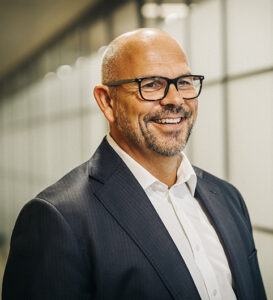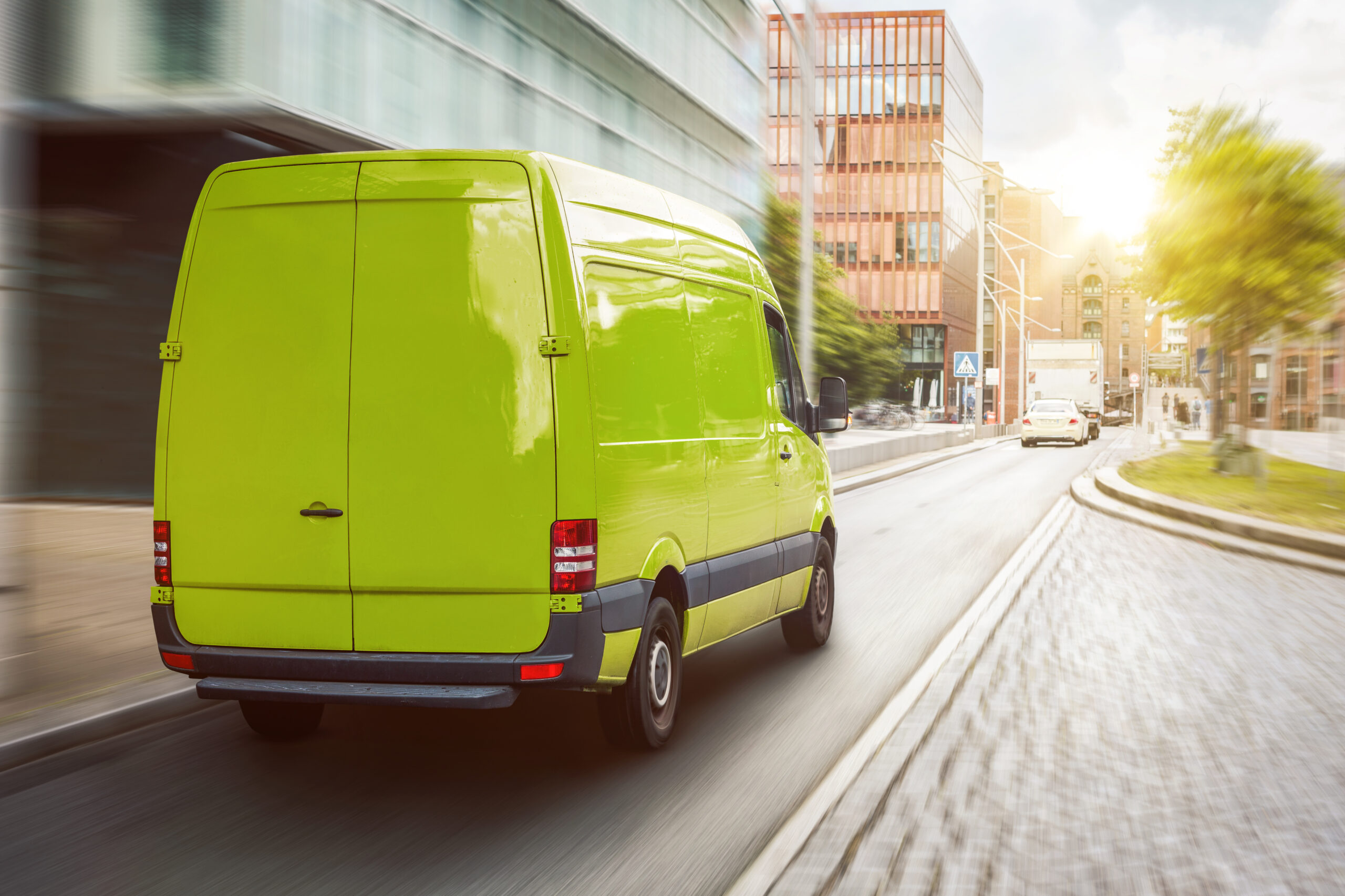In preparation for recording of the Beyond the Buy Button podcast series – now available to listen in full here – DeliveryX sat down with Yodel’s CEO Mike Hancox.

Firstly Mike, a little bit about you and your journey to Yodel?
I have been at Yodel now for three years as CEO. It’s my second time round at Yodel having been here almost 20 years ago. My career sort of splits into two – the first half I was in food manufacturing with Cadbury’s and Premier Foods. Then the second half of my career really started in 2000 when I joined the GUC PLC as CFO for their home shopping division. And I’ve been in retail since.
It was the very early days of the internet back in 2000 Yodel had a different name, but it was part of the portfolio that I was responsible for. Those businesses were sold to the Barkley family in 2003. And fortunately they gave me my first CEO role in a business that was then renamed as a Shop Direct.
From there I worked in Otto UK, running their retail and logistics businesses, then had a 10 year stint in television shopping under private equity ownership. It was very varied and a different form of distance retailing.
And then I was invited back to the Yodel business, which is very different from where it was 20 years ago, to lead what was hoped to be a transformation and a turnaround in the fortunes of Yodel.
A recent study found that 87% of consumers want proof of delivery, is this becoming more important that speed of delivery?
The first thing for me is to get the basics right. It’s absolute consistency of doing what you want to be good at – which is delivering a parcel within the service standards that you’ve contracted for. The consumer and the retail client want to know if they’re buying a 24 hour service, that parcel is going to go out in 24 hours. If they’re buying a service with a proof of delivery, they’re going to get it. If they’re buying a 48 hour service with no proof of delivery, that’s what they get.
At the time Yodel wasn’t known for that, there were some service issues for sure. The brand had taken a little bit of a kicking in PR circles. For me, there was a clear requirement to improve the perception of the brand and to make sure that the service standards were consistent because that’s the main thing that retailers are looking for.
When I came to Yodel, first of all, I would say I joined a really good team and they’d already set out that they needed to be good at the basics. And that led with customer service.
To make that an easier task there was a requirement to invest in technology. Yodel were behind our competitors. Our competitors had done some good stuff in terms of tracking parcels and communicating with customers, letting them know where the parcel was on the journey from the retailer to their front door.
It was pretty clear we needed to improve our message. We needed to make ourselves more accessible. We needed to improve the interaction either through web chat or through the telephone offering. We needed to focus on the social media metrics that people look at when they’re making decisions about brands, not just logistics brands.
In-flight tracking has become increasingly important to consumers, what is the next ecommerce delivery trend that carriers have to respond to?
I think the industry has gone through a series of changes – next day delivery became king to our deliveries in certain areas. It became the thing that people were aspiring to. But through it all, for me the most important thing is certainty of delivery in the timeframe.
There are more recently trends towards pick-up and drop-off locations rather than final mile. That is something that’s important for lots of reasons.It gives the end customer convenience. It gives them another option. It potentially is helpful for the green agenda in that it reduces the number of diesel choking vans going down a culdesac on any given day.
But the most important thing is the customer choice. For customers that are already out and about and potentially passing a pickup location, they do enjoy that experience.
Retailers and carriers have had a lot of challenges in the past few years, how did Yodel work through the pandemic?
We grew our volumes significantly. To put that into context about 30% from where we were at the start of the pandemic to where we finished and that has remained with us. We’ve stayed at that higher level of volume.
And for a national network such as ours – I’ll talk like an accountant – now we have a high fixed cost base. The ability to add 30% volumes is transformational in terms of what that means to your profits.
What we experienced on the road was a real change in the feeling towards delivery drivers. There was a lot of goodwill. We had just before the pandemic invested quite a lot of money into doorstep experience training for our drivers, which is something that I think had been neglected. So the timing of that was perfect in that we just finished that training, the pandemic happened and then people wanted to see the drivers. For us, it was transformational in terms of the perception of the brand in the eyes of many people, who’d had a poor delivery experience.
We also found it quite easy to recruit the drivers that were needed to deliver these additional volumes. We worked with a lot of people for the first time. We have taxi firms working on delivering for us because they couldn’t deliver people to destinations. But the secret of turning that into a successful experience was actually technology. We’d been working really hard on developing an app that was able to be downloaded onto any smart device that would increase the speed of training and effectiveness. As we took on more drivers through the pandemic, we gave them access to that technology to make their job easier. Several things came together through the pandemic.
You’d previously touched on pick-off and drop-off solutions helping Yodel take polluting vans off the streets, what other sustainable actions are you taking?
We are doing more than a million parcels a year now through bicycles, and the technology makes that a very secure process. The delivery through bicycles has got a number of advantages for us that allows us to get into major city centres that are difficult for the larger vans.
It does help us with our green credentials. At Yodel we’ve never “banged the drum” about being the biggest, or the best when it comes to those green credentials. We’ve had a slightly different agenda for the last few years, but we’ve done whatever we can, when we can, to make ourselves better. And using bicycle deliveries has been a good initiative for that reason.
As you alluded to there – bikes can go places that vans can’t, get to the final destination quicker, be more efficient. Is there other technology you’ve deployed to make the customer experience better?
What we’ve done is taken our client’s requirements and our understanding of the end customer and we have tried to build software that makes that easier. The scanning event for a carrier is really important because generally that’s the trigger of a message to the customer to say where their parcel is in the process.
Working back from the delivery we’ve been scientific in trying to understand what are the most important messages for that consumer to give them the confidence that we’re going to get that parcel to them in the right time frame. From there, we’ve worked back into what is the scaling event that will trigger either an email or an SMS or an update into a consumer app that says essentially “we’ve got it, this is where the parcel is, and this is how long it’s going to take to get to you”.
In turn that communication with the customer removes the need for the customer to ring a call centre, or to go onto a web chat and ask the usual, “where is my order” type calls, which are time consuming, expensive and mean that you need to have an army of call centre people.
We’ve tried to look at the consumer’s perspective to say – what would they want? And when would they want it? And let’s build some software that addresses that.
And what is next for Yodel?
Flexibility around the operation is clearly something that’s going to come. We don’t operate seven days a week at Yodel. We’re essentially a five and a half day a week operation. There are some clients that really want seven days.
That’s a big change for us. That will involve hiring a lot more people, changing our systems, changing our operation, but it has a potential big windfall for the company. So seven day working will be a big project and we’re looking hard at it.
We are still making better use of the infrastructure. We’re still a company that works off what I would call first wave deliveries – early in the morning the drivers go in, they load up the van and they go out for the day. We’ve got the physical infrastructure, we can look at second wave, maybe even third wave logistics throughout the day. Continuous logistics as some people refer to it. There’s a lot more that we can do.
Technology is also developing really quickly. There’s things that we can’t even imagine at the moment, but that will come along and increasingly I think many of the logistics companies would start to call themselves technology businesses at the same point.
We’ve touched on it already, but that sustainability green agenda. It is only going to grow in importance. And we can’t invest to the point that we lose money, but we have to think cleverly and tactically about how we can do more to reduce CO2 emissions as a business.
Click here to listen to the Shipping Economics episode in full







